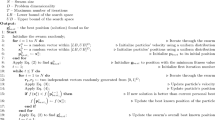Abstract
In this paper, we propose a new method for dynamic parameter adaptation in particle swarm optimization (PSO). PSO is an optimization method inspired in social behavior, which has been applied to different optimization problems obtaining good results. In this paper, we propose an improvement to the convergence and diversity of the swarm in PSO using interval type-2 fuzzy logic. Simulation results show that the proposed approach improves the performance of PSO. A comparison of the proposed method using type-2 fuzzy logic with the original PSO approach, and with PSO using type-1 fuzzy logic for dynamic parameter adaptation is presented.

















Similar content being viewed by others
References
Al-Jaafreh MO, Al-Jumaily AA (2007) Training type-2 fuzzy system by particle swarm optimization. In: IEEE congress on evolutionary computation 2007, CEC 2007. ISBN: 978-1-4244-1339-3
Biglarbegian M, Mendel J (2011) On simplifying interval type-2 fuzzy logic systems. In: IEEE transactions on systems, man and cybernetics
Castillo O, Melin P (2012) A review on the design and optimization of interval type-2 fuzzy controllers. Appl Soft Comput 12(4):1267–1278
Chandra Shill P, Faijul Amin Md, Akhand MAH, Murase K (2012) Optimization of interval type-2 fuzzy logic controller using quantum genetic algorithms. IEEE World Congr Comput Intell, pp 1027–1034
Chunshien L, Tsunghan W (2011) Adaptive fuzzy approach to function approximation with PSO and RLSE. Elsevier Exp Syst Appl 38:13266–13273
Engelbrecht A (2005) Fundamentals of computational swarm intelligence. University of Pretoria, South Africa
Haupt R, Haupt S (2004) Practical genetic algorithms, 2nd edn. A Wiley-Interscience publication, New York
Hongbo L, Ajith A (2007) A fuzzy adaptive turbulent particle swarm optimization. Int J Innov Comput Appl 1(1):39–47
Jang J, Sun C, Mizutani E (1997) Neuro-fuzzy and soft computing: a computational approach to learning and machine intelligence. Prentice-Hall, Upper Saddle River
Karnik NN, Mendel JM (2001) Centroid of a type-2 fuzzy set. Inf Sci 132:195–220
Kennedy J, Eberhart R (2001) Swarm intelligence. Morgan Kaufmann, San Francisco
Kennedy J, Eberhart R (1995) Particle swarm optimization. In: Proceedings of IEEE international conference on neural networks, vol IV. IEEE Service Center, Piscataway, pp 1942–1948
Liang Q, Mendel J (2000) Interval type-2 fuzzy logic systems: theory and design. IEEE Trans Fuzzy Syst 8(5):535–550
Marcin M, Smutnicki C (2005) Test functions for optimization needs. http://www.bioinformaticslaboratory.nl/twikidata/pub/Education/NBICResearchSchool/Optimization/VanKampen/BackgroundInformation/TestFunctions-Optimization.pdf
Martinez R, Rodriguez A, Castillo O, Aguilar LT (2010) UABC, Tijuana, Mexico. Type-2 fuzzy logic controllers optimization using genetic algoritms and particle swarm optimization. 2010 IEEE international conference on granular computing (GrC). ISBN: 978-1-4244-7964-1
Melin P, Olivas F, Castillo O, Valdez F, Soria J, Garcia J (2013) Optimal design of fuzzy classification systems using PSO with dynamic parameter adaptation through fuzzy logic. Elsevier Exp Syst Appl 40(8):3196–3206
Mendel Jerry M (2001) Uncertain rule-based fuzzy logic systems: introduction and new directions. Prentice Hall PTR, Upper Saddle River
Mendel J, John R (2002) Type-2 fuzzy sets made simple. IEEE Trans Fuzzy Syst 10(2):117–127
Muthukaruppan S, Er M (2012) A hybrid particle swarm optimization based fuzzy expert system for the diagnosis of coronary artery disease. Elsevier Exp Syst Appl 39:11657–11665
Oha Sung-Kwun, Janga Han-Jong, Pedrycz Witold (2011) A comparative experimental study of type-1/type-2 fuzzy cascade controller based on genetic algorithms and particle swarm optimization. Exp Syst Appl 38(9):11217–11229
Sepulveda R, Castillo O, Melin P, Rodriguez-Diaz A, Montiel O (2007) Experimental study of intelligent controllers under uncertainty using type-1 and type-2 fuzzy logic. Inf Sci 177(10):2023–2048
Shi Y, Eberhart R (2001) Fuzzy Adaptive Particle Swarm Optimization. In: Proceeding of IEEE International conference on evolutionary computation, Piscataway, NJ: IEEE Service Center, Seoul, Korea, pp 101–106
Taher N, Ehsan A, Masoud J (2012) A new hybrid evolutionary algorithm based on new fuzzy adaptive PSO and NM algorithms for distribution feeder reconfiguration. Elsevier Energy Convers Manag 54:7–16
Wang B, Liang G, ChanLin W, Yunlong D (2006) A new kind of fuzzy particle swarm optimization fuzzy\_PSO algorithm. In: 1st international symposium on systems and control in aerospace and astronautics, ISSCAA 2006, pp 309–311
Wu D (2010) A brief tutorial on interval type-2 fuzzy sets and systems (July 22, 2010)
Wu D (2011) An interval type-2 fuzzy logic system cannot be implemented by traditional type-1 fuzzy logic systems. In: World conference on soft computing, San Francisco, CA, May 2011, submitted
Wu D (2011) Comparison and practical implementation of type-reduction algorithms for type-2 fuzzy sets and systems. In: World conference on soft computing, San Francisco, May 2011
Wu D (2011) P-map an intuitive plot to visualize, understand, and compare variable-gain PI controllers, AIS 2011, pp 189–198
Wu D (2012) A constrained representation theorem for interval type-2 fuzzy sets using convex and normal embedded type-1 fuzzy sets, and its application to centroid computation
Wu D, Mendel JM (2011) On the continuity of type-1 and interval type-2 fuzzy logic systems. IEEE Trans Fuzzy Syst 19(1):179–192
Wu D, Tan WW (2010) Proceedings of interval type-2 fuzzy PI controllers why they are more robust. In: IEEE international conference on granular computing, San Jose
Zadeh L (1965a) Fuzzy sets. Inf Control 8:338–353
Zadeh L (1965b) Fuzzy logic. IEEE Comput 8:83–92
Zadeh L (1975) The concept of a linguistic variable and its application to approximate reasoning—I. Inform Sci 8:199–249
Author information
Authors and Affiliations
Corresponding author
Additional information
Communicated by V. Loia.
Rights and permissions
About this article
Cite this article
Olivas, F., Valdez, F., Castillo, O. et al. Dynamic parameter adaptation in particle swarm optimization using interval type-2 fuzzy logic. Soft Comput 20, 1057–1070 (2016). https://doi.org/10.1007/s00500-014-1567-3
Published:
Issue Date:
DOI: https://doi.org/10.1007/s00500-014-1567-3




